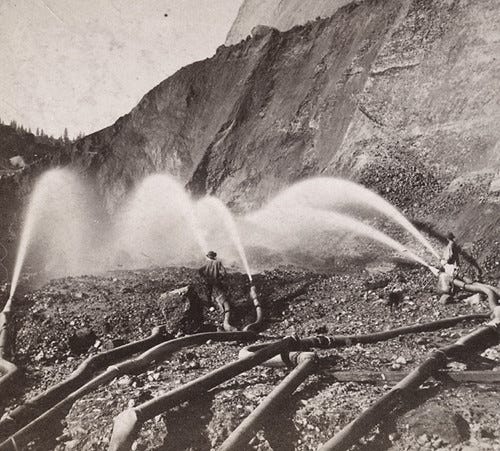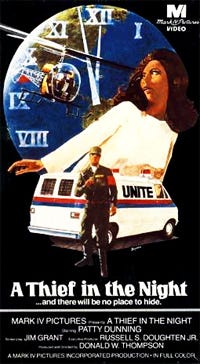At the height of the California gold rush, the town of Columbia was the golden state’s second largest city. From the 1850s to the 1870s, over $1 billion (today’s value) in gold was mined there. As the craze for riches continued, buildings in the town were actually knocked down or moved from one location to another so that the land beneath them could be scoured for the precious metal.
One common digging method during the Gold Rush was hydraulic mining, in which high pressure streams of water are used to separate dirt from rock and reveal what minerals may be below the surface. Today, in the Sierra Nevada Mountains that were heavily mined a century and a half ago, you can find large formations of naked rock sticking out of the ground with little dirt or vegetation to cover them. The rock has remained since the mud and sediment were washed away by hydraulic miners all those years ago.
At no point did any ’49er pick up a shovel-full of mud and show it off to their friends and neighbors. No self-respecting miner would take a bucket of dirt and sediment to the local assayer to find out how much it was worth. Because the answer is nothing. Mud is worthless to a miner. It’s there to be dug through to get to the good stuff, the gold that launched the Rush that gave my state its name.
spiritual hydraulic mining (aka gnosticism)
In a previous post, I said that Gnostics believed that salvation is enlightenment that comes from “secret knowledge.” The reason they believed this—and divorced spiritual knowledge from the rest of life in this world—is that they thought the only potentially redeemable part of a human being is the spirit.
The logic went like this: God is spirit; humans have a bit divine spirit in them; all they need to become like God is a bit of special sauce (secret knowledge) to liberate them from everything else (bodies, matter, time, etc.).
On this point, French theologian Ysabel De Andia explains that, according to Gnosticism, “only the spiritual part of humanity can be united to the divine Spirit, for it is a seed of the Spirit deposited in matter, like gold in the mud.” In other words, Gnostics acted like religious hydraulic miners, tossing out the mud and dirt of the body and everything physical about life in this world to get to the gold of the human spirit. Body and spirit have nothing to do with one another. You have to ditch one to find salvation in the other.
“There is no communion in the Gnostic universe,” writes De Andia. God can’t come together with a fully embodied human being. Gnosticism requires that you check your body at the door of the divine. For the Gnostic, “there is no participation.”
(there's no time to) change your mind
The church in which I grew up in Southern California was still smarting from a Jesus Movement hangover when I entered youth group in the ’90s. Hippies with guitars got saved in droves in the ‘70s. They grew up and had kids like me. And to keep us from going as bad as they did before they met Jesus, we were sent to teen gatherings where films like A Thief in the Night were screened to scare us straight.
Don’t get me wrong. I have countless fond memories of lock-ins, games like Sardines, and late night beach bonfires. The community I enjoyed at church was a genuine blessing. All the Bible memory verses I learned in Sunday school remain with me today. In so many ways, I’m grateful for God’s kindness to me in those years.
But the unwitting Gnosticism of the evangelical tradition in which I was raised has borne and continues to bear strange fruit. The decisionism of that church culture made it clear that there was one thing about me that was valuable—the gold of my soul. Everything else could be hydraulic-mined out of the picture.
The “mud” included things like my body, this world (that was going to burn in the Great Tribulation), and all the sinners who would be left behind when the Rapture happened. Secular music, films, and other media had to be washed away to protect the kernel of godlikeness inside. (I gave up all my CDs that weren’t explicitly Christian in middle and high school—twice.)
Kids like me gave their lives to Jesus over and over again around camp fires, during revivals, at the altar call. I filled out at least 9 “decision cards” before age 18, just to be sure I had for sure for sure for sure “changed my mind” and accepted Christ. Authoritative leaders ceaselessly sprayed down our consciences, washing away the meaningless mud to get to what they could count, measure, and use to prove they were doing their job: our golden souls.
healing from the american religion
The late Harold Bloom believed that Gnosticism—more truly than Christianity—is the American religion. I agree, not because I am a sociologist or scholar, but because I grew up in a Protestant evangelical church that taught me the habits and instincts of gnostic spirituality. The body and the material world don’t count. Matter doesn’t matter. What matters in God’s eyes is the soul.
This is not Christianity. The first Christian theologians that fought Gnosticism tooth and nail to protect the faith from its false teaching went a rather different direction. They did not practice an ethereal, other-worldly religion, where decisions by minds set souls free from the material world. The first Christians practiced an earthy, sacramental spirituality that offered everything in the world and everything that they were—body and soul—to God in Christ.
Hydraulic mining destroys landscapes and strips mountains bare. The Sierras are scarred from those harsh methods. Many people like me who grew up in strip-mining churches bear the scars of a spirituality that privileged minds and souls over the rest of who we are.
Much of what I do in the church now is the slow work of healing and repair. I don’t do the healing. Christ does. I simply administer the remedy He prescribed.
On the way to his martyrdom about 70 years after Calvary, St. Ignatius of Antioch described that remedy as the bread of communion, “which is the medicine of immortality, an antidote which prevents death, yet enables us to live at all times in Jesus Christ.”1
We can’t heal the scars of generations with a sermon series or a theological adjustment. You can’t put off gnostic spirituality with more knowledge or special sauces.
We heal simply, steadily, using the means of grace that Christ has offered. By faith, we receive Him in the sacraments, trusting in His promise to meet us there. The process of ecological renewal in the Sierras is slow; the healing we need in the church and in our spirituality may be even slower. But that healing is there, ready to be received by us in Christ’s offer of Himself in the bread and the wine and in fellowship with our brothers and sisters.
We don’t heal with grand theology or emotive experience. We heal in the slow, steady and local of a Christian life rooted in the tangible of time and place and others.
What about you? Have you experienced a “gold in the mud” Christianity? I’d love to hear your stories in the comments or by email!
Letter to the Ephesians, 20.2.









Loved the "You can’t put off gnostic spirituality with more knowledge or special sauces." Oh yes, it truly is ordinary and long-term plodding with others in an unimpressive place called the church.